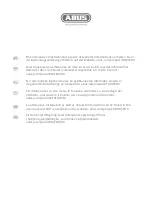
1. Intr
oduction
A. Speaker
. The speaker projects the voice
prompts when the DDU-2000 Series AED is
on. The speaker also emits a “beep” when
the unit is off and has detected a condition
that requires attention from the user or
needs servicing.
B. SHOCK Button*
(Semi-Automatic units
ONLY)
.
This button will flash when a shock is
recommended. Pressing this button will deliver
a shock when the button is flashing. This button
is disabled at all other times.
*IMPORTANT:
On the fully-automatic DDU-
2200, a
SHOCK Required Indicator
which
flashes when a shock is recommended and
the unit has charged and is to deliver a shock
is in the SHOCK button location.
Do not
touch the patient while this indicator is
flashing.
C. Display Screen
. Color display panel used to
display text and video prompts, messages,
indicators for rescue, unit status, and
maintenance operations. The display screen
provides visual prompts, including CPR
coaching. DDU-2450 models can also show
an ECG trace.
D. ON/OFF Button
. This button is used to turn
the DDU-2000 Series AED on and off.
E.
Pads Connector Socket
. The pads connector
(item N) is inserted into this socket.
F. Active Status Indicator (ASI)
. The ASI
indicates the current status of the AED.
This indicator flashes green to indicate
the unit has passed its last self-test and is
ready for use. It flashes red to indicate unit
needs attention from the user or needs
servicing.
G. Softkey Buttons
. Three context sensitive
softkey buttons are used to navigate menus
or select actions.
H. USB Port
. The USB port is provided to
perform data recovery and maintenance. Not
to be used during rescue operation.
I. Defibtech Data Card (DDC card)
.
This optional plug-in card provides enhanced
storage capabilities to the AED.
J. USB and Defibtech Data Card (DDC card)
Access Door
. Behind the access door is the
USB connector port and Defibtech Data Card
(DDC card) slot.
K. Battery Pack Opening
. This opening is
where the battery pack is inserted into the
unit.
L. Battery Pack Eject Release Latch
.
This release latch releases the battery pack
from the DDU-2000 Series AED.
M. Pad Storage Area
. The pad storage area is
found on the back of the AED allowing the
pads to be stored in a pre-connected state
for rapid deployment during an emergency.
N. Pads Connector
. This connector attaches the
patient pads to the unit at the pads connector
socket (item E).
O. Defibrillation Pads
. The defibrillation
pads are pads that are placed on the patient.
The pads should be stored in the pad storage
area (item M) on the back of the unit.
P. Defibrillation Pads Expiration Date
(back side)
.
The defibrillation pads
expiration date is located on the back side of
the pads package. Do not use the pads after
the printed date has passed.
Q. Battery Pack
. The battery pack provides
a replaceable main power source for the
DDU-2000 Series AED.
1.2 The Defibtech DDU-2000 Series AED
8
DAC-U2510EN-BF rev H









































